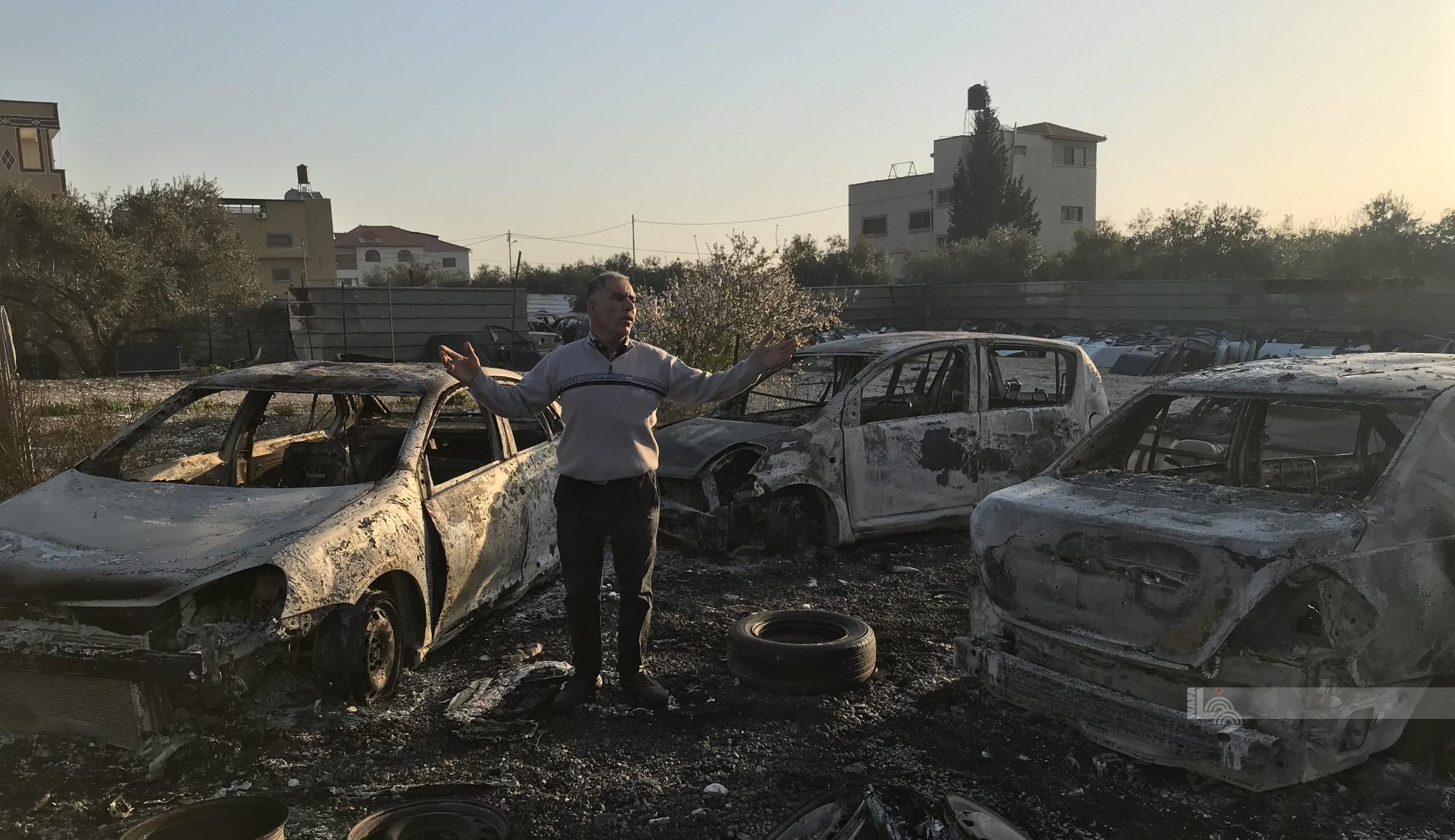A meeting in Jordan between Israeli, Jordanian, Palestinian, and Egyptian officials that took place shortly before the attacks was met with heavy criticism.
Israeli settlers protected by occupation forces (IOF) set fire to numerous Palestinian houses and vehicles in the town of Huwwara in Nablus on Sunday amid increasing escalations.
According to Palestine’s news agency (Wafa), settlers stoned houses as they marched through the town in the West Bank while assaulting Palestinians.
Settlers who rampaged through the village torched a total of 30 houses, burned 15 vehicles and assaulted dozens of Palestinians residence, including one who was killed.
In total, settlers carried out at least 300 violations against Palestinians in the latest round of violence, Wafa reported.
Earlier, two settlers were killed following a deadly Israeli raid on Nablus last week that claimed the lives of 11 Palestinians. The assault was the deadliest in the occupied West Bank in nearly two decades.
Since the start of the year, Israel has killed at least 65 Palestinians.
On Monday, the Israeli forces tightened a siege on Nablus in a move that analysts warned could spark even more escalations in the West Bank.
Commenting on the violence in Huwwara, Palestinian President Mahmoud Abbas said Israel was “protecting terrorist acts perpetrated by settlers” in the West Bank.
The United States has also condemned the settlers’ violence, saying they “underscore the imperative to immediately de-escalate tensions in words and deeds”.
“We condemn today’s violence in the West Bank, including the terrorist attack that killed two Israelis and settler violence, which resulted in the killing of one Palestinian, injuries to over 100 others, and the destruction of extensive property,” US State Department spokesman Ned Price said.
The US, which pumps $3.8 billion into Israel, has repeatedly failed to hold its ally to account.
In another statement, Canadian politician Niki Ashton described the assaults as “unacceptable,” and “horrifying.”
The United Kingdom’s ambassador to Israel Neil Wigan called on Israel to halt the violence and hold the perpetrators to account.
“Israel should tackle settler violence, with those responsible brought to justice,” Wigan said.
While Qatar has yet to issue a statement on the matter, the Gulf state has long condemned Israeli attacks towards Palestinians while staunchly ruling out normalisation with Tel Aviv.
The escalations have sparked fresh calls for accountability from human rights advocates and defenders worldwide.
“1 Palestinian killed, 390 injured, 100 cars set on fire. 35 homes totally burnt, 40 homes partially burnt. Don’t let the Zionists school you how these people were terrorists and legitimate target. Don’t let them enjoy their sickening impunity,” Palestinian activist Abier Khatib tweeted.
In another tweet, Tania Hary, Executive Director at Gisha-Legal Center for Freedom of Movement, said: “Happy to announce that we can conclude the debates about whether or not it’s apartheid and move on to whether it’s ethnic cleansing or genocide or both.”
“We all know what happens when supremacist power goes unchecked,” Hary added.
Aqaba meeting
Muhammad Shehada, Chief of Comms at Euro-Med Human Rights Monitor, said “NOT ONE Israeli official condemned the settlers pogrom on Huwara! At best, they called it ‘settlers taking THE LAW into their hands’.”
The attacks in Nablus took place following a five-party meeting in Aqaba, Jordan that was scheduled in a bid to quell violence amid fears of escalations in the West Bank.
Jordan, Egypt, the US, Palestine, and Israel attended the meeting.
According to the final communique, Palestinians and Israelis “affirmed their commitment to all previous agreements between them, and to work towards a just and lasting peace.”
It added that the Israeli and Palestinian governments “confirmed their joint readiness and commitment to immediately work to end unilateral measures for a period of 3-6 months.”
This includes an “Israeli commitment to stop discussion of any new settlement units for four months and to stop authorisation of any outposts for 6 months,” the statement added.
The five sides also agreed to hold another meeting in Sharm El Sheikh in March.
However, with the fresh round of violence on Sunday, the meeting was widely slammed by people in the Arab world.
“Do you meet or do not meet? Israel will not give you anything but more killing, displacement, imprisonment, demolishing buildings, increasing settlements, restricting movement and poverty,” a social media user said.
Another said, “The Aqaba meeting, the meeting to save Israel…among its most important decisions was the freezing of settlement construction for a period of four months, as in after four months you can expand settlements.”
Israel occupied the West Bank, Gaza, and East Jerusalem in a bloody war in 1967, widely known as “the six day war” and naksa, or “setback”.
Within six days, the Zionist state captured the majority of Palestine while forcibly dispossessing at least 300,000 Palestinians.







